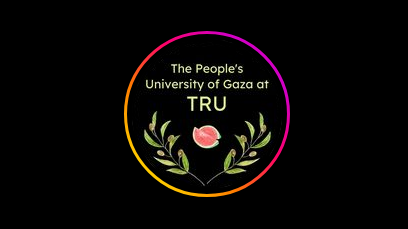Update Dec. 3, 2024: Thompson Rivers University has responded to this story with the following statement, “Last week, following the public posting of TRU’s investment statements in June, TRU received a proposal for divestment from a student group.
We will forward the proposal to our investment fund managers for review. TRU instructs our fund managers to follow the UN’s Principles for Responsible Investment (UN PRI) when making investment decisions. We are confident that our fund managers make financial decisions responsibly and in alignment with TRU’s Investment Objectives Policy (BRD 22-0).
We encourage everyone interested in TRU’s responsible investment practices to visit our Investments web page, where we will post investment statements at least annually.”
The original story continues below.
Thompson Rivers University is facing a call to divest from companies involved or aligned with Israel following the release of a detailed report by the activist group People’s University of Gaza at Thompson Rivers University.
The proposal, presented in November, requests that the university withdraw its investments from companies accused of complicity in human rights violations, particularly in relation to the Israel-Palestine conflict.
In June, TRU disclosed its investment portfolio in response to a freedom of information (FOI) request filed by the activist group in May, as reported by the Omega. According to the release, a team of TRU faculty and individuals from the group carefully reviewed the disclosed documents over the summer and fall.
Their findings highlighted several companies the People’s University alleges have violated international human rights standards, especially concerning the ongoing Israeli occupation of Palestine.
The divestment proposal identifies multiple companies with significant investments tied to the Israeli military and surveillance operations.
For example, Scotiabank, which TRU invests through, holds a substantial stake in Elbit Systems, a company the People’s University states is “Israel’s largest manufacturer of weapons” used in violations of Palestinian human rights.
Similarly, Microsoft is implicated through its provision of technology to the Israeli Defense Forces (IDF).
The divestment team, advised by TRU professors Peter Tsigaris (Faculty of Economics) and Alex Ng (Faculty of Accounting, Finance & Law), emphasized TRU’s ethical responsibility to align its investment practices with its core values of inclusion, sustainability and community-mindedness.
The proposal calls for a thorough review of TRU’s investment strategy, urging the administration to divest from companies associated with the Israeli occupation and its military operations until these companies demonstrate adherence to international law.
“TRU cannot uphold values of diversity and inclusion if it continues to financially support companies complicit in apartheid and crimes against humanity,” states the divestment proposal.
The report claims TRU’s investments in such companies are not only morally questionable but also pose financial and reputational risks for the university.
The activist group said the divestment initiative has gained considerable support within the community. In January, the TRU Students’ Union (TRUSU) passed a motion calling for a ceasefire in Gaza and reaffirmed its commitment to Palestinian human rights.
In addition to divestment, the group is calling on the university to revise its investment policy to ensure it will no longer invest in any companies listed by international human rights organizations, including the United Nations Human Rights Council and the American Friends Service Committee, which are alleged “…complicit in the surveillance, occupation, human rights violations, and murder of Palestinians by the State of Israel.”
The proposal asks TRU’s advisory team to conduct a more thorough review of the university’s investments and provide a formal report on the actions taken by January 31, 2025.
The proposal is part of a broader movement that seeks to hold institutions accountable for their financial support of companies linked to human rights abuses.
TRU’s administration has yet to respond to the request. Still, the divestment team remains hopeful that the university will take the necessary steps to align its financial practices with its values.
For TRU, the decision could have lasting effects, not only for its investment strategy but also for its relationship with students, faculty and the broader community, who are pushing for stronger ethical commitments in the wake of ongoing global conflicts.
Representatives for Thompson Rivers University did not respond to requests for comment by the time of publication.
The full proposal from the People’s University of Gaza at Thompson Rivers University may be viewed here.

